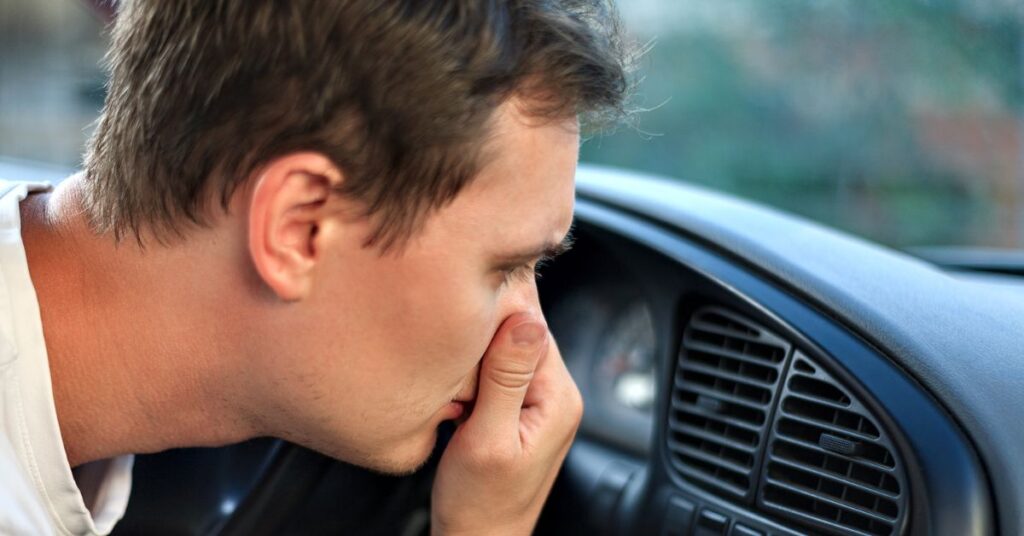
Table of Contents
Does your car smell like gas? If so, it needs immediate attention. Gas and fumes are flammable, so noticing a gas smell is something to take seriously. If your car smells like gas, we urge you to contact our shop immediately before severe damage can happen to you or your vehicle.
Reasons Why Your Car Smells Like Gas
Here’s what to do and potential answers to the question, “Why does my car smell like gas?”
Fuel Line Leak
Fuel line leaks are among the most common reasons a car smells like gas. The fuel line, which carries gasoline from the tank to the engine, can develop leaks due to wear and tear, corrosion, or damage from road debris. These leaks are dangerous because they can lead to fuel wastage and increase the risk of fire, especially if gasoline comes into contact with the hot parts of the engine. It’s essential to have your vehicle inspected by a professional mechanic as soon as you notice a persistent gas smell.
Loose or Faulty Gas Cap
The gas cap plays a crucial role in sealing the fuel system and maintaining pressure within the tank. A loose, damaged, or missing gas cap can cause gasoline fumes to escape. This not only results in a gas smell but also triggers the check engine light and can lead to a decrease in fuel efficiency. Regularly checking the gas cap’s condition and ensuring it is correctly fastened after refueling can often resolve this issue.
Fuel Injector Leak
Fuel injectors deliver gasoline to the engine in a fine, high-pressure mist. If an injector leaks, it can drip fuel onto the engine or other components under the hood. This leak causes a gas smell and can lead to engine performance issues. Fuel injector leaks require prompt professional attention to avoid further engine or fuel system damage.
Fuel Tank Leak
Though less common, a leak in the fuel tank is a serious concern. Cracks or holes in the tank, often due to impact or corrosion, can leak gasoline. This results in a strong odor of gas and is a significant fire hazard. Fuel tank issues should be addressed immediately by a professional to ensure safety.
Engine Running Rich
If the engine runs rich, there is too much gasoline and not enough air in the fuel mixture. This can result in unburnt fuel exiting the vehicle through the exhaust, producing a gas smell. Causes for a rich fuel mixture include problems with the fuel injectors, oxygen sensors, or air filters. A diagnostic check can pinpoint the exact cause and help rectify the issue.
Oil Contamination
Gasoline can sometimes seep into the engine oil, especially if there is a problem with the engine’s internal components. This contamination usually occurs over time and can produce a gasoline-like smell, particularly noticeable when the engine is running or just after it’s been turned off. Regular oil changes and engine maintenance can prevent this issue, but if gasoline is found in the oil, it’s crucial to have the engine checked for potential problems.
Schedule Service To Fix Your Car Smelling Like Gas
Experiencing a persistent gas smell in your car can be problematic and potentially hazardous. It’s a clear sign that your vehicle needs professional attention. At McCullough NAPA Auto Care, we specialize in diagnosing and repairing issues related to fuel systems and other causes of gasoline odors. Our team of skilled technicians is equipped to handle everything from simple fixes like securing a loose gas cap to more complex repairs such as fixing fuel line leaks or replacing a faulty charcoal canister. We use advanced diagnostic tools to accurately identify the root cause of the gas smell and provide reliable, efficient solutions.
Don’t ignore a gas smell in your car. It’s not just about eliminating an unpleasant odor—it’s about ensuring your safety and the proper functioning of your vehicle. Schedule a service with us today, and let our experts care for your car. Drive confidently, knowing your vehicle is in good hands and free from potentially dangerous fuel-related issues.
FAQ About Why Your Car Smells Like Gas
Driving a car that smells like gas is generally not safe. A gasoline smell often indicates a fuel leak or a problem in the fuel system, both of which can be serious safety hazards, including the risk of fire. It’s best to have your car inspected by the professionals at McCullough NAPA as soon as possible to identify and resolve the issue.
If your car smells like gas but you don’t see any visible leaks, it could be due to evaporative leaks in the fuel system, a faulty charcoal canister, or even a rich fuel mixture in the engine. Sometimes, minor leaks in the fuel line or injectors can also be hard to detect visually. A thorough inspection by our team of ASE-certified mechanics is recommended to find the exact cause.
Fixing a car that smells like gas involves identifying and addressing the source of the smell. This could range from tightening a loose gas cap to repairing a fuel line leak or replacing a faulty charcoal canister. Diagnosing the issue correctly is essential, which typically requires professional assistance.
Smelling gas through your car vents can indicate an issue with the vehicle’s fuel system or exhaust system. Possible causes include leaks in the fuel line near the engine, problems with the evaporative emission system, or exhaust leaks. These issues should be inspected and repaired by a qualified mechanic, such as the ones at McCullough NAPA.
Signs of a bad fuel pump include a sputtering engine, power loss, decreased fuel efficiency, difficulty starting the car, and the engine not starting at all. A malfunctioning fuel pump can’t deliver the necessary fuel to the engine, leading to performance issues.
Yes, the check engine light may come on if there is a gas leak. Modern vehicles are equipped with sensors that can detect evaporative emissions leaks in the fuel system. However, not all gas leaks will trigger the check engine light, especially if they are external to the engine’s evaporative system.

